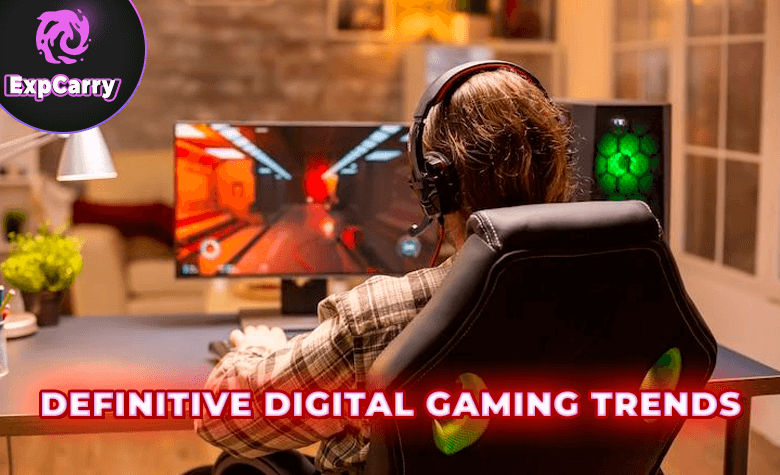Definitive Digital Gaming Trends

Whether it’s the latest immersive gaming experience sweeping players off their virtual feet or a brand-new piece of bleeding edge kit, the global gaming industry is no stranger to trends! But which of the multitude of trends that have arisen over the past few decades have proved to have the most staying power, and what new innovations are on the horizon that will shape the future of gaming?
Let’s take a look!
The Role of Advanced Technology
Technology trends, in particular, have accelerated the growth of the gaming world over the past few decades, transforming it from being a niche hobby to a lucrative and thriving major industry. The gaming landscape now encompasses an array of sectors and genres, from pioneering online casino games to revolutionary open world digital experiences. It's no wonder, then, that analysts such as Grand View Research have speculated that the games market will reach $583.69 billion by 2030.
In all fairness, digital gaming has stood at the very forefront of innovation since the day of its existence. With each new generation of consoles or PCs hitting the market, we’ve seen the boundaries of tech possibilities pushed to new limits. The first generation of home consoles were revolutionary in terms of the level of innovation that was on display. Since then, advanced graphics, immersive audios and, of course, the introduction of online play have all contributed to making the industry the Big Tech behemoth that it is today.
Gaming Goes Online
Some trends, no matter how technologically advanced they seemed at the time, have fallen by the wayside. But. there’s no doubting the impact and longevity of online multiplayer gaming. Although multiplayer games existed during the initial console boom of the 1980s and 90s, they were limited by the fact that each player had to be in the same room, hooked up to the same gaming machine. When internet connectivity became more mainstream, it opened up whole new realms of multiplayer possibilities, enabling players from all four corners of the globe to connect, collaborate and compete in the same game.
Those earlier MOBAs (multiplayer online battle arena games) like League of Legends and World of Warcraft even laid the foundations for the modern-day eSports sector — itself a blossoming market with an average audience of 318 million. As the decades progressed, online multiplayer games became ever more advanced, creating virtual ecosystems where players can even adjust video games (modding).
The Future of Gaming?
In recent years, the use of extended reality technologies like augmented reality and virtual reality have become a lot more popular in the gaming industry. AR is certainly more accessible to a wider range of gamers than VR, largely due to the fact that mobile AR games require little more than a compatible smartphone and a data connection to run as opposed to a separate headset. But the two technologies are providing major progress in the advancement of the industry.
However, what are newly emerging trends that will likely stick around for the long haul? Well, Artificial Intelligence and GameFi are two of the hottest new developments in gaming that will surely be macro players in shaping the future of gaming.
Artificial Intelligence
AI has, in some form or another, been a mainstay in video game development for a while now. Its latest form, though, is considered a booming emergent market. What’s different about AI in 2024 as opposed to AI in 2014 is that it's effectively opening new frontiers for gaming that will transcend the sandbox and open world gaming experiences populating the market today. The likes of Elden Ring and Red Dead Redemption 2 are universal favorites among the gaming community, possessing some of the best immersive, open world environments and compelling gameplay. AI, however, has the potential to improve even the most exemplary of titles.
Generative AI, as well as boosting the quality and interaction of NPCs in games, could be used to build open games that deliver infinite opportunities for interaction. Tailor-made storylines and personalized gameplay would be par for the course, while the world-building itself would be unlike anything we’ve seen so far.
GameFi
A burgeoning market in the cryptocurrency and blockchain space, GameFi combines gaming with decentralized finance (DeFi). In layman's terms, the sector fuses digital gaming with blockchain technology and decentralized assets such as non–fungible tokens (NFTs). A core GameFi segment that is proving popular with traditional video games and crypto enthusiasts alike is the Play to Earn (P2E) segment.
The radical core concept behind P2E gaming is to actively reward gamers with decentralized financial products for playing titles and completing in-game tasks, as opposed to having to compete for monetary prizes or purchase in-game assets. Such rewards typically take the form of NFTs, or crypto tokens and the ownership will pass exclusively to the gamer. Moreover, each digital asset has real world value, so players can swap, trade, and sell them, or even exchange them for fiat currencies.